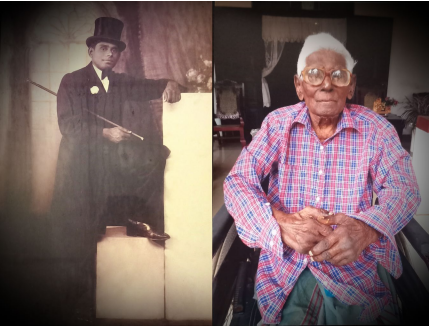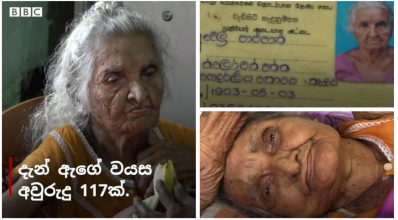Old Joe- living up to 103- By Dr harold Gunatillake
Compiled and written by Dr harold Gunatillake OAM

The secrets to a long life could be revealed by the diets of supercentenarians (that’s people who live to be more than 100 years old).
https://tillthemountainsdisappearams.blogspot.com/2022/08/the-oldest-living-josephian-103-year.html

This is the most inspiring story I have read for a long time, written about an old Josephian (St Joseph College, Colombo, Sri Lanka), Basil Siriwardena, still living in the Kochchikade area, at 103, written by Avishka Seneviratne and Akila de Sva.
I am disappointed that no mention has been recorded as far as his favourite diet so that we could get some advice regarding dietetic habits about the accepted longevity foods.
The Adventist Health Study 2, following 96,000 Americans since 2002, found that the people who lived the longest were not vegans or meateaters. They were “pesco-vegetarians,” or pescatarians, who ate a plantbased diet, including a small portion of fish, up to once daily. In other Blue Zones diets, fish was a standard part of everyday meals, eaten on average two to three times a week.
Among women who lived longest seem to have been eating chocolates daily. Calment of France additionally mentions bacon and eggs for breakfast.
Centenarians in Sri Lanka.
I am inspired because 4.5 per cent of the people in the world belong to the age above 90, and proud to note that a few Sri Lankans are in those statistics.
Sri Lankan village folk live long compared to the town folk.

A woman named Velu Pappani was killed after a brief illness in Nagoda Hospital. She is from Kalutara Dodangoda, Nehinna area. Velu Pappani was born on 1903 May 03rd.
Records show that there is another person who passed away at 116, Kankanam Gamage Dingihami in Weligama in southern Sri Lanka. Dingihami was born on Jan. 11, 1906. Her age was confirmed by the Sri Lankan government in 2017, with the latter giving a certificate that she was 111 years old. She is the mother of two sons and a daughter; her
husband passed away 40 years ago. She was a vegetarian, and she was hospitalised once only for an illness in 1982
Another Sri Lankan, Apullanalada Ukku, who lived up to 116, is mentioned in the Guinness book of records.
It is observed that the persons who lived the longest in Sri Lanka are from the villages. Maybe fresh unpolluted air and less stressful living are responsible, unlike living in polluted urban suburbs.
Generally, genetics may be responsible because some families live longer despite not living healthy or having the means to live a healthy life, as seen in most of our villages in Sri Lanka.
They generally toil hard for survival due to poverty and lack of means to purchase essential items in search of comfort, like the town folk. Their toilets are not attached to their bedrooms for convenience, but they have to walk a few metres with a bucket of water to their bathrooms. So daily exercising through hard work and exertion are part of everyday life, unlike the town folk has to find time for their daily walk or visit the gym for a workout.
However, this is not true in most other countries. It turns out that environmental factors like diet and lifestyle are essential.
Now the oldest person in the Guinness book of world records is Jeanne Louise Calment lived in France and died at the age of 122. She credited a diet rich in olive oil for her longevity Calment also reportedly ate almost a kilogram of chocolate every week (but she also smoked almost her entire life, only quitting at 117 — suggesting her longevity was more down to luck than lifestyle). Chocolate was also favoured by Leandra Becerra Lumbreras, a Mexican woman who (dubiously) claimed to have lived at least 127 years.(ref:honey/coach)
Bacon
Susannah Mushatt Jones, an American woman who was the world’s oldest person till her death in May 2016, ate four strips of bacon every day for breakfast, followed by more bacon “all day long”. The World Health Organisation has recommended we cut back on bacon consumption, so Jones’s diet tip probably isn’t one you should adopt for long
life…(honey/coach) The oldest verified man is Jiroemon Kimura (1897–2013) of Japan, who lived to the age of 116 years and 54 days.
The Guinness World Records have recorded a Venezuelan man as the world’s oldest living man. As of 17 May 2022, Juan Vincente Mora is a record-breaking 112 years and 355 days old, with his 113th birthday fast approaching.
The three oldest persons alive are
Italian woman Emma Morano was the world’s oldest person. (The title of “world’s oldest person” tends to change frequently for obvious reasons.) Ahead of her 117th birthday on November 29, 2016, Morano spoke to Agence France-Presse about what she eats daily: “I eat two eggs a day, and that’s it. I eat cookies.” In 2015, Morano said she eats three eggs a day — raw. That unusual diet could be the secret to her longevity… or maybe it’s just good luck and genetics ¯
The oldest family
The 13 Donnelly siblings of County Armagh, Ireland, were recently declared by Guinness World Records to be the oldest family: they have a combined age of more than 1075 years. They credit their long lives with daily servings of plain old porridge. “The key is that you need to get your oats at night,” Leo Donnelly, the youngest of the siblings at 72, told the Telegraph. “Porridge at around 10 pm, then porridge again for breakfast at 7 am. Cooked oats, milk, perhaps a spot of jam on top. People thought it was unusual, but now the living proof is there for all to see.” (Ref honey)
A known fact for longevity and health without medication
Walking intermittently or continuously daily for over an hour, sustaining a plant-based diet, reducing your stress factors, having a frequent social life with a good home environment, controlling your weight, and having a few
alcoholic drinks may be the answer to longevity, including the genetic component.
Any comments direct to:
About the author: Dr Harold Gunatillake, Health Editor, is a Member of the Academy of Medicine, Singapore. Member of the Australian Association of Cosmetic Surgery. Fellow of the Royal College of Surgeons (UK), Corresponding Fellow of the American Academy of Cosmetic Surgery. Member of the International Societies of Cosmetic Surgery, Fellow of the International College of Surgery (US). Australian diplomat for the International Society of Plastic, Aesthetic & Reconstructive Surgery. Board Member of the International Society of Aesthetic Surgery. Member of the American Academy of Aesthetic & Restorative Surgery. Life Member of the College of Surgeons, Sri Lanka. Bachelor of Medicine & Bachelor of Surgery (Cey). Government scholar for higher studies in the UK.
Disclaimer:
The information contained in this article is for general information purposes only, and whilst the author will endeavour to keep the information up to date and correct, eLanka makes no representations or warranties of any kind, express or implied, about the completeness, accuracy, reliability, suitability or availability with respect to the eLanka website or the information, products, services, or related graphics contained in this article for any purpose. Any reliance you place on such information is therefore strictly at your own risk. In otherwords, eLanka In no event will we be liable for any loss or damage including without limitation, indirect or consequential loss or damage, or any loss or damage whatsoever arising from loss of data or profits arising out of, or in connection with, the use of this website / article. Also please note that through this website / web page articles you are able to link to other websites which are not under the control of eLanka and therefore we have no control over the nature, content and availability of those sites. The inclusion of any links does not necessarily imply a recommendation or endorse the views expressed within them.







